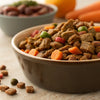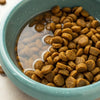Can Cats Eat Dry Dog Food? Understanding the Risks and Nutritional Needs
- Houndsy
Table of Contents
- Introduction
- The Nutritional Needs of Cats vs. Dogs
- Can Cats Eat Dog Food? The Short Answer
- Why Shouldn’t Cats Eat Dog Food?
- Strategies for Multi-Pet Households
- What to Do If Your Cat Eats Dog Food
- Conclusion
Introduction
As pet owners, we often find ourselves in amusing scenarios where our furry friends seem to have a penchant for each other's food. Ever caught your cat sneaking a few kibbles from your dog's bowl? At that moment, a common question arises: can cats eat dry dog food? This inquiry is not just a matter of curiosity; it’s a crucial aspect of ensuring our pets’ health and well-being.
Statistics indicate that around 30% of pet owners have witnessed their cats indulging in their canine companions' meals at some point. While it may seem harmless in the short term, the underlying implications of this behavior can be significant. This blog post aims to explore the nutritional differences between cat and dog food, the potential risks of cats consuming dog food, and what steps we can take to ensure our pets maintain a balanced diet tailored to their individual needs.
By the end of this article, you’ll have a thorough understanding of why cats should not regularly consume dog food, the dangers of doing so, and alternative feeding strategies for multi-pet households. We invite you to reflect on your feeding routines and consider how they impact your pets' health.
The Nutritional Needs of Cats vs. Dogs
Different Dietary Requirements
Cats and dogs have evolved into distinct species with unique dietary needs. Understanding these differences is fundamental to answering our primary question.
- Cats are obligate carnivores: This means they require a diet primarily made up of meat. Essential nutrients like taurine, arachidonic acid, and certain vitamins must come from animal-based sources.
- Dogs are omnivores: They can thrive on a mixed diet of both plant and animal products. This flexibility allows dogs to obtain their nutrients from a wider variety of foods.
Key Nutritional Differences
Here are some critical nutrients that differ between cat and dog food:
- Protein Content: Cat food typically contains 30-40% protein, essential for their muscle health and overall well-being. In contrast, most dog foods have only 18-26% protein.
- Taurine: This amino acid is vital for cats and must be included in their diet. Dogs can produce taurine on their own, which is why it is often absent from dog food formulations.
- Arachidonic Acid: Cats cannot synthesize this fatty acid, necessitating its inclusion in their diet. Dogs can produce it, making it less critical in their food.
- Vitamin A: Cats need preformed vitamin A from animal sources, while dogs can convert beta-carotene from plants into vitamin A.
The Consequences of Nutritional Deficiency
Feeding a cat dog food over time can lead to significant health issues. Some potential consequences include:
- Weakened immune system: A lack of essential nutrients can compromise a cat's ability to fight off infections.
- Heart disease: Insufficient taurine can lead to dilated cardiomyopathy, a serious heart condition.
- Vision problems: A deficiency in vitamin A can result in poor vision or even blindness.
- Digestive issues: Cats may experience vomiting or diarrhea if their digestive systems are not accustomed to the ingredients in dog food.
Can Cats Eat Dog Food? The Short Answer
Technically, yes, cats can eat dog food without immediate toxicity. A nibble here and there is unlikely to cause harm. However, the key takeaway is that dog food does not meet the nutritional needs of cats.
Occasional Nibbles vs. Regular Consumption
If your cat takes a few bites of dog food occasionally, it should not cause any immediate health issues. However, if they start consuming dog food regularly or as a primary food source, you could be setting up for long-term health problems.
Emergency Situations
In emergencies where cat food is unavailable, dog food can serve as a temporary substitute. However, it should not replace a balanced cat diet for an extended period.
Why Shouldn’t Cats Eat Dog Food?
Long-Term Health Risks
Feeding cats dog food regularly can lead to severe health complications. Here are some of the long-term risks associated with a diet lacking in essential nutrients:
- Malnutrition: Prolonged consumption of dog food can lead to deficiencies that affect overall health.
- Organ Damage: The lack of proper nutrients can lead to issues in vital organs, including the liver and kidneys.
- Behavioral Changes: Nutrient deficiencies can also affect a cat's behavior, leading to lethargy or irritability.
Signs of Nutritional Deficiency
As a responsible pet owner, it is crucial to be vigilant for signs that your cat may not be getting the right nutrition. Some symptoms to watch for include:
- Weight loss or gain
- Changes in appetite
- Lethargy or unusual behavior
- Digestive issues like vomiting or diarrhea
- Poor coat quality
Strategies for Multi-Pet Households
Keeping Dog Food Away from Cats
If you have both cats and dogs in your home, managing their feeding can be challenging. Here are some strategies to keep your cat away from dog food:
- Separate Feeding Areas: Establish distinct feeding zones for each pet to minimize the chances of cross-contamination.
- Elevated Dog Bowls: Using elevated bowls can make it harder for cats to access dog food while allowing dogs to eat comfortably.
- Scheduled Feeding Times: Avoid free feeding. Instead, provide meals at specific times and supervise the feeding process to ensure each pet eats their designated food.
- Automatic Feeders: Consider investing in automatic feeders that can dispense food at set times, reducing the chances of one pet stealing food from another.
Encouraging Proper Eating Habits
Sometimes, cats may be drawn to dog food simply out of curiosity or boredom. To encourage proper eating habits:
- Variety in Cat Food: Offer different types and flavors of cat food to keep your feline friend interested.
- Interactive Feeding: Use puzzle feeders to make mealtime more engaging, encouraging your cat to focus on their food rather than the dog's.
What to Do If Your Cat Eats Dog Food
If you find your cat has eaten dog food, here are steps you can take:
- Monitor for Symptoms: Keep an eye on your cat for any signs of distress, such as vomiting, diarrhea, or lethargy.
- Consult Your Veterinarian: If your cat shows any concerning symptoms or has been eating dog food regularly, it’s best to consult with a veterinarian.
- Adjust Diet Accordingly: If your cat has developed a habit of eating dog food, work on transitioning them back to a proper cat diet.
Conclusion
In summary, while cats can occasionally nibble on dog food without immediate harm, it is not suitable for their long-term health. Understanding the nutritional needs of our pets is vital for their well-being, and ensuring they receive a balanced diet tailored to their species is our responsibility as pet owners.
The differences in dietary requirements between cats and dogs highlight the importance of providing species-appropriate food. As we strive to create a harmonious multi-pet environment, employing strategies to keep food separate and offering engaging meal options will help maintain our pets’ health.
Reflect on your feeding routines—are they meeting your pets' needs? If you're looking for ways to simplify feeding time and enhance your pet care experience, consider exploring the Houndsy Kibble Dispenser. It’s designed with convenience and style in mind, ensuring your pet’s meals are both accessible and aesthetically pleasing.
FAQ
Can cats eat dog food occasionally?
Yes, cats can eat dog food in small amounts without immediate harm, but it should not be a regular part of their diet.
What are the primary dangers of cats eating dog food?
The main risks include nutritional deficiencies leading to health issues such as heart disease, vision problems, and organ damage.
How can I keep my cat from eating dog food?
Separate feeding areas, elevated bowls, scheduled feeding times, and automatic feeders can help prevent cats from accessing dog food.
What should I do if my cat eats dog food?
Monitor your cat for any symptoms of distress and consult your veterinarian if any concerning signs arise, especially if dog food consumption becomes a habit.
What type of food should I provide for my cat?
Cats require high-quality cat food formulated specifically to meet their nutritional needs, including high protein content and essential nutrients like taurine and arachidonic acid.












